Home | Category: Muhammad and the Arab Conquest / Muhammad / Muhammad
MUHAMMAD’S EARLY LIFE

baby Muhammad
Muhammad ibn Abdullah (Muhammad, the son of Abdullah) was born in A.D. 570 near the Kaaba in Mecca. His father died before he was born and his mother died when he was six, leaving him an orphan. He was raised by his grandfather, a kindly uncle and a Bedouin wet-nurse.
Although born into the Quraysh tribe, one of the most powerful tribes in Arabia and the ruling tribe Mecca. Muhammad was among its "poorer cousins." The Quraysh were primarily a tribe of city dwellers, although members spent time in the desert which Muhammad did. When the citizens of Mecca began having problems with Muhammad it was his clan and tribe that kept him from getting thrown out earlier not his religion.
Muhammad passed his youth as shepherd, a frankincense trader, and camel driver who accompanied caravans that traveled in and out of Mecca. When he was 12 he accompanied his uncle’s caravan as far as Syria. Little is known about the period that followed except that Muhammad became a rich businessman.
Until he was 40, Muhammad's life was not that much different than other businessmen. He was regarded as a good husband and father and practical but illiterate businessman. He was well respected and regarded as an honest trader and a skilled negotiator.
Everything we know about Muhammad's life comes from Muslim historiography. The Prophet worked for Abu Talib in the caravan business, giving him the opportunity to travel beyond Arabia. Travel gave the Prophet contact with some of the Christian and Jewish communities that existed in Arabia; in this way he became familiar with the notion of scripture and the belief in one god. Despite this contact, tradition specifies that Muhammad never learned to read or write. As a child, however, he was sent to the desert for five years to learn the beduin ways that were slowly being forgotten in Mecca. [Source: Helen Chapin Metz, ed. Saudi Arabia: A Country Study, U.S. Library of Congress, 1992 *]
Laurie Goldstein wrote in the New York Times: “Muhammad was born in a nouveau riche Mecca. Unlike most Arabs, the Meccans were not nomads but traders and financiers who profited from the caravans that stopped in Mecca for water from its underground spring. The site was holy to the Bedouin because it housed the Kabah, a cube-shaped granite building that was tended by Muhammad’s tribe, the Quraysh. “Muhammad was orphaned as a child and taken in by relatives, but his fortunes changed at the age of 25 when he married Khadija, an older widow who hired him to manage her caravans. [Source: Laurie Goldstein, New York Times, May 20, 2016 ==]
Websites on Muhammad: Encyclopædia Britannica britannica.com ; Muhammad: Legacy of a Prophet — PBS Site pbs.org/muhammad ; Prophet Muhammad prophetmuhammad.com; Islamic History: History of Islam: An encyclopedia of Islamic history historyofislam.com ; Oxford Encyclopedia of the Islamic World oxfordislamicstudies.com ; Sacred Footsetps sacredfootsteps.com ; Internet Islamic History Sourcebook fordham.edu/halsall/islam/islamsbook ; Islam IslamOnline islamonline.net ; Institute for Social Policy and Understanding ispu.org; Islam.com islam.com ; BBC article bbc.co.uk/religion/religions/islam ; Islam at Project Gutenberg gutenberg.org
RECOMMENDED BOOKS:
“Muhammad: A Prophet for Our Time” by Karen Armstrong Amazon.com ;
“Muhammad: His Life Based on the Earliest Sources” by Martin Lings Amazon.com ;
“Revelation: The Story Of Muhammad” by Meraj Mohiuddin Amazon.com ;
“The Sealed Nectar: Biography of Prophet Muhammad” by Darussalam Publishers, Safiur Rahman Al Mubarakpuri, et al. Amazon.com ;
“Muhammad: His Character and Conduct” by Adil Salahi Amazon.com ;
“The Messenger: The Meanings of the Life of Muhammad” by Tarqi Ramadan Amazon.com ;
“Islam, a Short History “ by Karen Armstrong Amazon.com ;
“Islam Explained: A Short Introduction to History, Teachings, and Culture” by Ahmad Rashid Salim Amazon.com ;
“The Holy Quran” Arabic Text English Translation (English and Arabic Edition) Leather Bound Amazon.com ;
“The Holy Qur'an with English Translation and Commentary” by Maulana Muhammad Ali Amazon.com ;
“Life of the Sahaabah (RA): True companions of the Prophet Muhammad [PBUH]” by Sheikhul Hadeeth Hadhrat Moulana Muhammad Zakariyya Amazon.com ;
“The Cambridge Companion to Muhammad” by Jonathan E. Brockopp Amazon.com ;
“Encyclopedia of Muhammad's Women Companions” by Muhammad Hisham Kabbani and Laleh Bakhtiar Amazon.com ;
“The Wives of the Prophet Muhammad” by Ahmad Thompson Amazon.com ;
“The Wives of the Prophet Muhammad” by Faridah Masood Debas Amazon.com
Sources on Muhammad’s Life
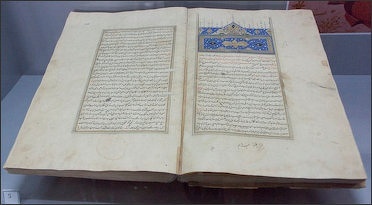
Mulla Mumin, Biography of the Prophet Muhammad
A biography of Muhammad — a Sira — was written by Ibn Ishaq, an Arab who lived in the century after Muhammad did, dying around A.D. 773. It is one of the few full biographies of the Prophet.
Maxime Rodinson, a French Marxist historian, sociologist and orientalist, wrote in “Muhammad”: “Nothing is known for certain about Muhammad's childhood. The void has gradually become filled with legends which grow ever more beautiful and edifying with the passage of time. Even the earliest and most moderate accounts must be treated with great caution. When Islam became the religion of a powerful state, precepts were needed to regulate social life. Divergent opinions and interests naturally existed. Political parties also grew up, centred round the Prophet's family and Companions. In addition, a great many people - impelled by curiosity, piety or even historical interest - demanded information about Muhammad's life. Men began to appear who were professional repositories of traditions; they would spread a tale to satisfy this curiosity or that piety, or to provide a ruling as occasion demanded; for the Prophet's deeds had an exemplary value. [Source: Maxime Rodinson (1915-2004), “Muhammad,” Pantheon Books, 1980, Beginning with pp. 38 ^\^]
”When he acted in a particular way, it was to show his followers that this was the way all men should act, whether in serious matters such as the finer points of laws of succession (the principles of which were laid down by God himself in the Qur’an), or on the smallest details of everyday behaviour, like proper table manners. Like our modern historians, the keepers of tradition were expected to quote their sources; but these were oral ones. Such a story came from such a one who in turn had it from another, and so on all the way back to one of the Prophet's contemporaries who had seen him do it or heard him say it. It was of course a simple matter to make up false traditions (the Arabic word is hadith, meaning 'narratives') to support one's own party or opinion. The great Arab historians and jurists knew this perfectly well. They tried to do away with the false traditions - those, for example, where the chain of authorities cited was manifestly impossible - but they made no claims to any degree of certainty. Instead, they were content to repeat contradictory traditions on the same subject, one after the other, quoting their sources for each. It was up to the reader to decide which one he liked to believe. 'But God knows best,' they would often add. ^\^
“The oldest collections of historical traditions available to us date from about I25 years after the Prophet's lifetime. Much imagination may have gone to work in the meantime. And yet many facts can be established, as the parties who differ most widely are agreed on the main events of the Prophet's life, the names of his Companions and his wives, their kinship and genealogy, as well as on a great many other things, even down to details which are far from remarkable which nobody would have deemed worth inventing. But there are many points on which we are very far from certain; in particular, it is clear that little was known about the early years of Muhammad's life, and that much has been made up about it. I shall occasionally quote some of these tales, whose only virtue from an historical point of view is that they create a picture of a world not unlike that in which the young Muhammad must have grown up, besides giving us some idea of the way in which later Muslims pictured the life of their prophet.” ^\^
Muhammad’s Birth, Mother and Step Mother (Nurse)
Maxime Rodinson, (1915-2004) a French Marxist historian, sociologist and orientalist, wrote in “Muhammad”: “No one knows exactly when Muhammad, who was to become the Prophet of Allah, was born. It was believed to have been during the reign of Khusro Anosharwan, that is before 579, which seems probable. It was said to have been in the Year of the Elephant - the year, that is, in which the birds of the air routed the army of Abraha before Mecca - but that is certainly untrue. The precise date, arrived at by means of some highly dubious calculations, varies between 567 and 573. The most commonly accepted year is 57I. [Source: Maxime Rodinson (1915-2004), “Muhammad,” Pantheon Books, 1980, Beginning with pp. 38 ^\^]
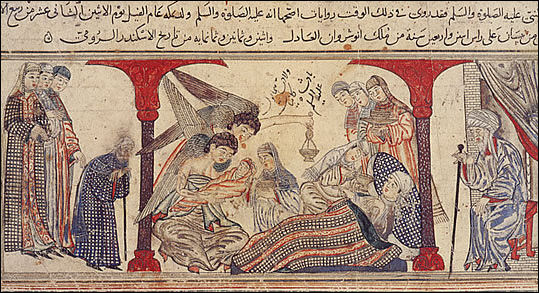
Birth of Muhammed
“Muhammad, or Mahomet as we sometimes call him, was born in Mecca of a father called 'Abdallah and a mother whose name was Amina. He belonged on his father's side to the clan of Hashim of the tribe of Quraysh. These traditional statements, while not wholly incontestable, may reasonably be regarded as sure. ^\^
In his biography of Muhammad, Ibn Ishaq wrote: “It is alleged in popular stories (and only God knows the truth) that Amina d. Wahb, the mother of God's apostle [Muhammad], used to say when she was pregnant with God's apostle that a voice said to her, "You are pregnant with the lord of this people and when he is born say, 'I put him in the care of the One from the evil of every envier; then call him Muhammad.'" As she was pregnant with him she saw a light come forth from her by which she could see the castles of Busra in Syria.” [Source: Juniata Middle Ages Online Reader, juniata.edu ***]
“Halima the apostle's foster mother used to say that she went forth from her country with her husband and little son whom she was nursing, among the women of her tribe, in search of other babies to nurse. This was a year of famine when they were destitute.... They could not sleep the whole night because of the weeping of her hungry child. She had no milk to give him, not could their she-camel provide a morning draught, but we were hoping for rain and relief. 'I rode upon my donkey which had kept back the other riders through its weakness and emaciation so that it was a nuisance to them. When we reached Mecca, we looked out for foster children, and the apostle of God was offered to everyone of us, and each woman refused him when she was told he was an orphan, because we hoped to get payment from the child's father. We said, "An orphan! and what will his mother and grandfather do?" and so we spurned him because of that. Every woman who came with me got a suckling except me, and when we decided to depart I said to my husband: "By God, I do not like the idea of returning with my friends without a suckling; I will go and take that orphan." He replied, "Do as you please; perhaps God will bless us on his account." So I went and took him for the sole reason that I could not find anyone else. I took him back to my baggage, and as soon as I put him in my bosom, my breasts overflowed with milk which he drank until he was satisfied, as also did his foster-brother.... When we used to have him with us my flock used to yield milk in abundance. We milked them and drank while other people had not a drop, nor could they find anything in their animals' udders. ***
“[A learned man] told me that some of the apostle's companions asked him to tell them about himself. He said: "I am what Abraham my father prayed for and the good news of [my brother] Jesus. When my mother was carrying me she saw a light proceeding from her which showed her the castles of Syria. I was suckled among the B. Sa'd b. Bakr, and while I was with a brother of mine behind our tents shepherding the lambs, two men in white raiment came to me with a gold basin full of snow. Then they seized me and opened up my belly, extracted my heart and split it; then they extracted a black drop from it and threw it away; then they washed my heart and my belly with that snow until they had thoroughly cleansed them. Then one said to the other, weigh him against ten of his people; they did so and I outweighed them. Then they weighed me against a hundred and then a thousand, and I outweighed them. He said, 'Leave him alone, for by God, if you weighed him against all his people he would outweigh them.'" ***
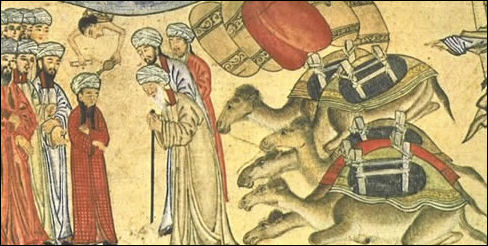
Muhammad a youth meeting a monk, from the Bahira compendium
Muhammad’s Tribe
Muhammad was born in Mecca at a time when the city was establishing itself as a trading center. For the residents of Mecca, tribal connections were still the most important part of the social structure. Muhammad was born into the Quraysh, which had become the leading tribe in the city because of its involvement with water rights for the pilgrimage. By the time of Muhammad, the Quraysh had become active traders as well, having established alliances with tribes all over the peninsula. These alliances permitted the Quraysh to send their caravans to Yemen and Syria. Accordingly, the Quraysh represented in many ways the facilitators and power brokers for the new status quo in Arabian society. [Source: Helen Chapin Metz, ed. Saudi Arabia: A Country Study, U.S. Library of Congress, 1992 *]
Tribes consisted of clans that had various branches and families, and Muhammad came from a respectable clan, the sons of Hashim, but from a weak family situation. Muhammad's father Abd Allah had died before his son was born, leaving the Prophet without a close protector. The Prophet was fortunate, however, that his uncle Abu Talib was one of the leaders of the Hashimite clan. This gave Muhammad a certain amount of protection when he began to preach in 610 against the Meccan leadership.*
Muhammad’s Family
Maxime Rodinson wrote in “Muhammad”: “'Abd al-Muttalib may have owed his position to the fact that he was at the head of one of the coalitions formed by the Meccan clans in their struggle for power. Two of these groups were in a state of constant rivalry, while a third remained neutral. 'Abd al-Muttalib traded with Syria and the Yemen and had obtained certain profitable privileges at the shrine of Mecca. It was he who supplied the pilgrims with food and water. He is said to have entered into negotiations with Abraha when the army with its elephants appeared outside Mecca. There may be some reference here to an attempt on the part of one group of clans to win support from outside. He had a number of wives from different tribes who gave him ten sons, Muhammad's father and uncles, as well as six daughters. Some of these we shall meet again. [Source: Maxime Rodinson, “Muhammad,” Pantheon Books, 1980, Beginning with pp. 38 ^\^]
“One of these children was 'Abdallah, his son by Fatima bint 'Amr of the Qurayshite clan of the Banu Makhzum. We are told that 'Abdallah was a handsome fellow. His father, no doubt seeking an alliance with the clan of the Banu Zuhra, asked for the young Amina bint Wahb as a bride for his son, and at the same time for her cousin, Hala bint Wuhayb, of the same tribe, for himself. ^\^

Muhammad's parents and their ancestry
“In accordance with the Arab custom, Amina seems to have remained with her own people and been visited there by Abdallah. Muhammad was the first and only child of this marriage. While it can obviously have no historical value, it may perhaps be of interest here to cite one of the stories which circulated about Muhammad's conception. This is in striking contrast to the Christian concern at making the birth of Christ as nearly as possible unconnected with any sexual relations whatever. ^\^
“'Abdallah went to the house of another wife he had besides Amina bint Wahb. He had been working in the clay on some land he possessed, and he still had some splashes of clay left on him. He made some advances to her, but she put him off on account of the clay that was on him. He left her and washed himself, and cleaned off the clay. Then he went out again, to go to Amina. He again passed by the other woman, who called to him; but he put her off and went to Amina. He went in to her and possessed her. She then conceived Muhammad, may God's blessing and peace be upon him. Then he went back to the other woman and asked her if she were willing; she said: 'No. When you passed by me there was a white light between your eyes. I called to you and you rejected me. You went to Amina and she has taken away the light.'
“Another version of the story makes this woman not another of 'Abdallah's wives but a sister of the hanif Waraqa ibn Nawfal, or another woman who, like Waraqa, was versed in the scriptures. Seeing the light of prophecy upon 'Abdallah, she offered him a hundred camels to gain his favours. He refused her and, when he came away from Amina, the light had gone. ^\^
“'Abdallah died, either during his wife's pregnancy or shortly after her delivery, while on a business trip to Medina on his way home from Gaza. He left his wife very little, only one slave, five camels and a few sheep. Amina cared for her son; but before long, when the child was only six years old, she too was dead.” ^\^
Muhammad and His Uncle Abu Talib
Muhammad was raised by his uncle, Abu Talib, a well-respected and powerful member of the Quraysh, who provided Muhammad and, later, his community with protection. Rodinson wrote : “Amina died on the way home from a journey to Medina with her slave Umm Ayman and young Muhammad. The boy was six years old. His grandfather, the venerable Abd al-Muttalib, who was then eighty years old, took him to live with him. But he died two years later. Muhammad was then taken in by one of his uncles, 'Abd Manaf, who is more generally known later by his kunya, or second name, Abu Talib. (An Arab's second or more familiar name means ' father of ', and generally referred to his eldest son.) In fact the meaning of his first name was idolatrous, signifying 'servant of the goddess Manaf'. He was a merchant in comfortable circumstances, the son of the same mother as Muhammad's father 'Abdallah, and is said to have been the person who took over the leadership of the Hashim clan - said to predominate at Mecca at this time - after his father's death. [Source: Maxime Rodinson (1915-2004), “Muhammad,” Pantheon Books, 1980, Beginning with pp. 38 ^\^]
“The story goes that Abu Talib sometimes travelled into Syria leading a caravan. On one occasion, at least, he is said to have taken his nephew. They came to the town of Bostra (Busra), the first big junction on the caravan route travelling in this direction, a meeting place of five important roads, and a great centre of Christianity. A fine cathedral had been built there not long before, and there were other impressive monuments, such as the Roman theatre which can still be seen today, and also no doubt the poor-house erected by Justinian. It was also the official residence of the Monophysite bishop, whose authority extended over the desert Arabs and whose appointment the Ghassanid phylarch al-Harith had obtained from the Empress Theodora in 543. It was at Bostra that an incident is said to have taken place, one version of which the historian Tabari recounts as follows:
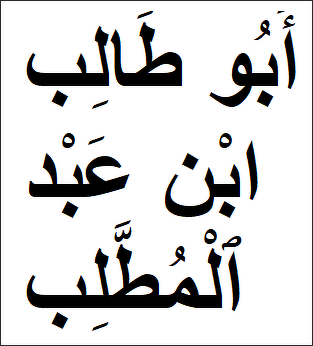
Abu Talib
“When the company halted at Bostra in Syria, there was a monk named Bahira, who dwelt in a hermitage there and who was well-read in the learning of the Christians. There had always been a monk in this hermitage, who used to extract this learning from a book which, they claimed, had been handed down as an heirloom from one to another. This year, when the caravan halted near Bahira, he prepared much food for them. While he was in his hermitage, he had seen the Envoy of Allah among his companions; and a cloud covered him with its shadow. They came forward, and halted in the shade of a tree that was near Bahira. He looked at the cloud, but the tree gave shade and its branches leaned down over the Envoy of Allah so that he was always in their shade. When Bahira saw this, he came out from his cell and sent word to invite them all. When Bahira saw the Envoy of Allah, he watched him very closely, and noted the details of his person.... When the party had finished eating and were about to take their leave, he questioned the Envoy of Allah about the things he felt when he was awake or asleep. The Envoy of Allah answered him. Bahira found all this according to the description which he had in his possession. Then he examined his back and found the seal of prophecy between his shoulders. Then Bahira said to his uncle Abu Talib: 'What relation is this boy to you ? ' And Abu Talib answered: ' He is my son.' Bahira said to him: ' He is not your son. This boy's father cannot be living.' ' He is my nephew, ' Abu Talib told him then. The monk asked: 'What became of his father?' 'He died while his mother was pregnant.' You speak the truth. Go back then to your own land and keep him safe from the Jews. By Allah, if they see him and get to know what I know about him they will try to harm him.'
“The uncle, much impressed, hurried back to Mecca with the precious child. Is there any kernel of truth in this story? We cannot be sure. There can be no doubt that some of the motives behind it are apologetic. It was important to have the Prophet recognized as such by one of the great monotheistic religions from which Islam claimed descent. The Christians took up the legend, seeing the supposedly heretical monk as the Arab prophet's inspiration, so as to deprive him of all originality. There is nothing intrinsically improbable in the journey to Bostra or in any other journeys. Attempts have been made to gather evidence that Muhammad was acquainted with many lands; but on the other hand it has been observed that he seems to have had no first-hand knowledge of the rites of the Christian faith. If he had been present, even once, at one of its services, it would certainly have left some impression. The Arab poets who visited Hira and its churches describe them with much more animation. ^\^
“Tradition lays great stress on Abu Talib's fondness for his nephew and his good care of him. It has been suggested that here, too, hagiography may have twisted the facts. At all events, Muhammad no doubt had to perform the small services expected of a child. One day, long afterwards, when some people passed the Prophet carrying the fruits of the arak tree, a thorny bush used to feed camels and other animals, Muhammad is supposed to have told them: 'Take care of the black fruit. It was those I gathered when I used to lead the sheep out to graze.' They said to him: 'Envoy of Allah, were you then a shepherd of sheep ? ' He answered: ' Yes, and so have all prophets been.' The story was told to humble the pride of the great nomad camelherds, who despised the shepherds of more humble flocks. ^\^
“This is virtually all we know about the childhood and young manhood of the future Prophet, at least from earlier sources, before the proliferation of legends of all kinds grew out of all reasonable control. Obviously it is not very much, and we are on very shaky ground. And yet it would be interesting and, from a historical point of view, extremely valuable to know what kind of education he had. Muslim tradition insists that he had no dealing with the pagan cults of his native city. This seems unlikely, and there are clear indications in his later life to suggest that, like everyone else, he practised the religion of his fathers. We are told elsewhere that he sacrificed a sheep to the goddess al- 'Uzza. One little-known tradition has him offering meat which had been sacrificed to idols to a monotheist, who refused it and rebuked him. He is said to have belonged to the hums, a brotherhood which practised its own special rites at Meccan ceremonies and observed additional taboos. Whatever Arabic tradition may have assumed from a wrong interpretation of a word in the Qur’an, it seems certain that Muhammad learned to read and write. But except for a few vague and unreliable pointers in his life and work we have no way of knowing the extent of his learning. More will be said of this further on.” ^\^
Muhammad’s Wives, Women and Children
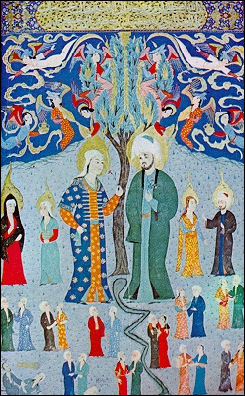 Muhammad’s first wife, Khadija, was a wealthy, twice widowed, businesswoman who proposed to him after she had hired him to help her with a business deal in Syria. He was 25 and she was 40 when they were married. They were married 25 years and had six children. She appears to have been the boss in the family. She hired him to run caravans for her business.
Muhammad’s first wife, Khadija, was a wealthy, twice widowed, businesswoman who proposed to him after she had hired him to help her with a business deal in Syria. He was 25 and she was 40 when they were married. They were married 25 years and had six children. She appears to have been the boss in the family. She hired him to run caravans for her business.
Muhammad liked the company of women, sought their advise and helped with household chores. There are stories in the Qur’an of him competing against his wives in archery, horseback riding and swimming. Muhammad decreed sexual fulfillment was a woman’s right. The women associated with him were often strong and independent and stood up to him. While Khadija was alive Muhammad did not marry again. When he was banished to Medina he married again, mostly for political reasons, to forge ties with tribal leaders. His second wife Sawdah was a widow who had just returned from Ethiopia.
Muhammad’s third and favorite wife, Aisha, was the daughter of his friend Abu Bakr. She was six when she married Muhammad and was nine when the marriage was consummated. As a child she was allowed to play with dolls as long as they did not resemble people. As a young adult she was a warrior who once directed troops in a battle from the back of a camel. Muhammad died with his head on her lap.
Muhammad married eight other women, including the daughter of Omar, and had 11 total wives. The later wives tended to be older. None bore Muhammad any children. They became known as “the mother of the believers,” and played a role in spreading the teachings of Islam. His other wives and concubines included an imam and a leatherworker. His daughter Fatima was a skilled political leader. His beautiful and talented granddaughter Sukayna married several times and once insisted in writing that her husband be forbidden from disagreeing with her about anything.
See Separate Article MUHAMMAD, HIS WIVES AND WOMEN africame.factsanddetails.com
Muhammad, the Successful Businessman
As a young man Muhammad earned his living as a business manager for Khadijah’s caravans. By the age of 30, Muhammad had become a respected member of Meccan society. He was known for his business skills and trustworthiness (his nickname was al-Amin, "the trustworthy".
Rodinson wrote: “Now that he was prosperous he certainly continued in business. His language was always studded with commercial terms. He was well thought of by his colleagues. His daughters later made respectable marriages - right and proper, and according to custom. Ruqayya, and perhaps Umm Kulthum as well, married their cousins on the father's side, sons of Abu Lahab. He was one of Muhammad's uncles and later to become one of his greatest enemies. However, he seems at this time to have been in an excellent social position, taking over from his brother Abu Talib as leader of the clan of Hashim. Another daughter, Zaynab, married her maternal cousin, Abu l- 'As. [Source: Maxime Rodinson (1915-2004), “Muhammad,” Pantheon Books, 1980, Beginning with pp. 38 ^\^]
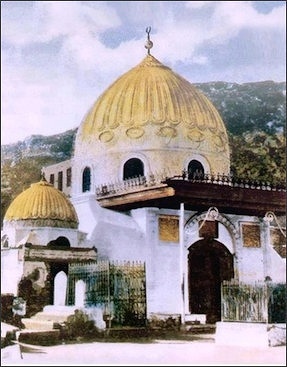
Khadija's tomb
“The following story, if true, would be an indication of the regard in which Muhammad was held. Unfortunately it has certainly been embellished and may even be an outright invention, whose purpose was apologetic. The Ka'ba had fallen into disrepair and people had taken advantage of its dilapidated state to steal its treasures. The Qurayshites, at the height of their financial prosperity, decided to rebuild it, but hesitated to touch the sacred stones in order to carry out the demolition work initially required. Moreover they lacked materials and skilled workmen. The timely wreck in the Red Sea of a Greek ship, carrying wood to Abyssinia for the building of a church, seemed to them like a sign from heaven. They appropriated the cargo washed up on the shore of the Hejaz and also a Coptic carpenter named Pacomius who happened to be on board. The rebuilding proceeded at a good pace, after the initial panic when a bold man took it on himself to strike the first blow with his pick at the old building. The whole town spent an anxious night expecting him to be struck down by supernatural powers; but in the morning he was still in excellent health, and the work went on. At last the time came to replace the Black Stone at the corner of the building. The four tribal groups all laid claim to the honour and in the heat of the argument were on the point of coming to blows. They decided to appeal to the first man who came into the sanctuary as arbiter. This was Muhammad. He sent for a cloak and, placing the sacred stone inside, made a representative of each tribe hold one of the four corners. They raised the cloak and carried the stone to its place. Then he himself set it in position. ^\^
“Muhammad would then have been thirty-five years old. He was given, it is said, the name of al-amin - the sure man, in whom one could trust. He was rich, or at least comfortably off, surrounded by affection, respected by all and with a part to play in his own small sphere. He might have gone on living like this, quietly and happily. Everything was in favour of it. ^\^
Muhammad, the Unfilled Successful Businessman
Rodinson wrote: “And yet he was not satisfied with this humdrum existence, day in, day out. He had an underlying restlessness. He wanted something more. His fundamental psychology in every detail will always be a mystery; but, while laying no claim to any impossible and almost certainly misleading analysis, yet, taking into account the trends of human behaviour pointed out for us by Freud, it is possible to make some observations on which to build some kind of psychological hypothesis. [Source: Maxime Rodinson (1915-2004), “Muhammad,” Pantheon Books, 1980, Beginning with pp. 38 ^\^]
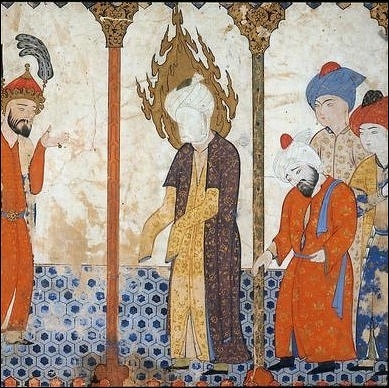
“In general, Muhammad gave the impression of a sensible, deliberate and well-balanced man. All his life we find him thinking before taking a decision, conducting his public and private business efficiently, knowing when to bide his time and when to retract, and capable of taking the necessary action to ensure the success of his plans. His physical courage, although perhaps acquired rather than instinctive, was adequate to enable him to figure creditably in the various battles of his lifetime. He was a remarkably able diplomat, and capable of reasoning with clarity, logic and lucidity. And yet, beneath this surface, was a temperament which was nervous, passionate, restless, feverish-filled with an impatient yearning which burned for the impossible. This was so intense as to lead to nervous crises of a definitely pathological kind. ^\^
“Muhammad had, as the phrase goes, everything to make him happy, and yet he was not happy. Happiness, with its limitations, Its calm or eager acceptance, its resignation to things as they are, is not made for those who are always looking beyond what they are and what they have, whose questing spirit is always reaching out for the next thing to be desired. And a poor, deprived, orphan childhood such as Muhammad's was bound to foster the growth of this endless capacity for desiring. Only success on an extraordinary, one might even say superhuman, scale, would satisfy it. ^\^
“Muhammad was certainly dissatisfied. Were there more tangible reasons for an attitude of mind without which his later development cannot be understood, and if so what were they? We can glimpse them faintly. Strange as it may seem to us, one of the things which affected him most was the fact that he had no male heir. With the Arabs, as with the Semitic peoples in general, this was a source of shame; and men who suffered it were called by the name of abtar, which means roughly ' mutilated '. One day, in the early days of his prophecy, Muhammad the abtar heard a voice from heaven declaiminY to him these vengeful lines: ‘Yes, we have given you abundance. So pray your Lord and sacrifice; It is your enemy who is the abtar! — Qur’an cviii
Muhammad Frustrated Over Not Having a Male Heir?

Muhammad giving the hand of his daughter, Fatima, to Ali
Rodinson wrote: ““Khadija's inability to give him male heirs no doubt provided an additional reason for some dissatisfaction with his excellent wife. One recalls Ammianus' comments on 'the passion with which the two sexes abandon themselves to love among this nation [the Arabs] '. And, of the doctors of the Talmud, Rabbi Nathan declared that nowhere in the world was there such a propensity towards fornication as among the Arabs, just as nowhere was there any power like that of Persia, or wealth like that of Rome, or magic like that of Egypt. The same observed that, if all the sexual licence in the world were divided into ten parts, then nine of these would be distributed among the Arabs and the tenth would be enough for all the other races. All around him Muhammad saw the wealthy Qurayshites using and abusing the pleasures of love. Each man, merchants and travellers especially, was allowed by custom to take wives for a limited period. Polygamy was perhaps less widespread than has been suggested, but divorce was simple and frequent. Outright prostitution, not readily distinguishable from temporary marriage, also occurred. Religious rites seem to have involved occasional ritual copulation. Young and beautiful slave-girls were easily bought. But Muhammad was wedded to Khadija and to her alone. It is possible that their marriage contract involved an obligation on his part to take no second wife. [Source: Maxime Rodinson (1915-2004), “Muhammad,” Pantheon Books, 1980, Beginning with pp. 38 ^\^]
“The wealthy Khadija was in a position to make demands. But, as a man known for his belief in fairness and moderation, Muhammad was bound to the mother of his children by ties much stronger than any written undertaking. Even so, knowing what we do of his amorous proclivities later on in life, we can scarcely imagine that there were not plenty of times when he, in the Gospel phrase which would probably have astounded him, 'committed adultery in his heart'. He must have thrust away temptation many times, perhaps even with deceptive ease. But whether they appeared easy or hard, we know now what these victories may have cost him and what a sense of frustration they may have left behind. ^\^
“Yet another cause of dissatisfaction, and one less often remarked, was the driving spur of ambition - legitimate ambition, due to a very clear consciousness of his own worth. Muhammad no doubt considered himself an exceptional person from a very early age. He saw few of the people around him take any interest in the religious, moral and intellectual questions which occupied him. The rich Qurayshites, his relatives and friends, acquired political influence by virtue of their wealth, their capacity for intrigue and their apparent competence in dealing with public affairs. Muhammad's interests at the time must have gained him the reputation of an inoffensive idealist, quite unfitted to cope with practical matters. And yet he had a deep inner conviction that what he knew and what he foresaw was more important than all the complex calculations of political men, even in the worldly perspective of effective guidance of the Meccan community, and perhaps beyond it, in that of the Arabs as a whole. ^\^
Muhammad, Deeply Troubled on the Inside?
Muhammad was reflective in nature and often retreated to the quiet and solitude of the desert around Mount Hira, where contemplated life and experienced his first revelations. Rodinson wrote: “The troubles of a man mocked for his lack of male heirs, the frustration of a highly sexed man whose own moral conscience prevented him from realizing his desires, the suppressed fury of a man fundamentally sure of himself but treated with contempt by practical politicians - all these things were capable of creating a personality thirsting to turn the tables in each particular, but still keeping strictly within the normal bounds of the society in which he lived. There was something in Muhammad which made him overstep those bounds. [Source: Maxime Rodinson (1915-2004), “Muhammad,” Pantheon Books, 1980, Beginning with pp. 38 ^\^]
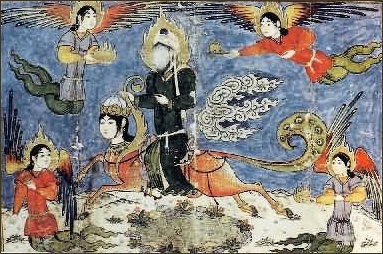
Indonesian painting of Muhammad riding a mythical beast
“This something was a certain pathological element in his make-up. Perhaps the stories about the angels who came and took him and opened his heart while he was pasturing flocks belonging to his nurse's family actually developed from accounts of some kind of seizure. H. alima is said to have come up on him one day standing amazed and stupefied. When questioned, he told a story of two men in white robes who came to him and opened his breast and touched 'something, I know not what'. His foster-father was worried and said: ' Halima, I fear that this boy may have had an attack. Take him back to his family before his disease declares itself.' Muhammad, it will be remembered, was no more than six years old. ^\^
“This story may be a complete fabrication. It may be, too, that as a child Muhammad had some mental experience of the kind known to many shamans of north and central Asia, and also to Australian magicians: at the moment of their initiation they feel that a spirit has taken away their internal organs and replaced them with fresh ones. However that may be, the Prophet certainly suffered from attacks of some kind in adult life. Hostile Christians put it down to epilepsy. If this were so, it was a benign form. What is much more probable is that Muhammad's psycho-physiological constitution was basically of the kind found in many mystics. ^\^
Muhammad: a Kahin, an Arab Holy Man?
Rodinson wrote: “In all societies and among all races individuals are found who, because of something in their constitution or their personal history which it is the psychiatrist's job to unravel, find it difficult or even impossible to adjust to the roles which society expects of them. In some cases their behaviour brings them into violent conflict with their environment. Others succeed in making some kind of adjustment, especially since many societies have allotted exceptional roles to these exceptional people. This often takes the form of making those with a particular kind of abnormality responsible for contacts with the supernatural world, the world of gods and spirits. [Source: Maxime Rodinson (1915-2004), “Muhammad,” Pantheon Books, 1980, Beginning with pp. 38 ^\^]
“Some of these individuals possess exceptional gifts. They see things which others do not see, hear things which others do not hear. A feeling they cannot explain makes them utter words and gestures which are quite outside the normal behaviour patterns of ordinary people. All this is naturally put down to their contact with another world - the world of powers which, while they cannot normally be seen or heard, can perform what to the common run of mortals is impossible. Some of these extraordinary beings are, of course, very far from normal; while in others the strangeness and abnormality manifests itself only rarely, in particular circumstances, and in the course of everyday life they behave just like everyone else. There are some whose inferior mental capacities are not enhanced by their special peculiarities; others, on the contrary, possess complex and powerful personalities with a capacity for rich and original thought. ^\^
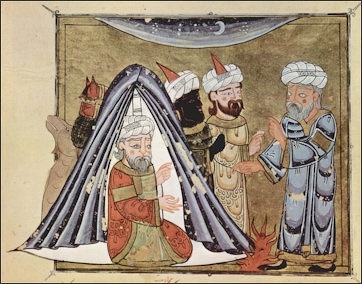
“Pre-Islamic Arabia had its own share of such men. Arab poets were believed to be inspired by a spirit. Above all, there was the kahin or soothsayer, a word etymologically related to the k~hen or priest of the Jews. The kahins had visions; but, what was more important, they also possessed familiar spirits, which they called companions or friends or 'seers' and which spoke through their mouths. The spirits' inspiration took the form of a vague mumbling or of short, staccato rhymed phrases, with repeated oaths which called freely on the names of the stars, morning and evening, plants and animals - all delivered in a breathless, rhythmic voice which made a great impression on the audience. While they were prophesying in this way, the kahins would cover themselves with their cloaks. They were highly respected, appealed to and consulted as oracles and advisers in both public and private matters. ^\^
“Muhammad had many traits in common with the kahins, as his contemporaries could not fail to notice. Physiologically and psychologically he belonged, undoubtedly, to the same type. Like them, he was liable to emotional attacks, with a tendency to see, hear and feel things beyond the reach of other people's senses. It may be that the deep-rooted dissatisfaction, which was both the cause and effect of his temperament as he approached the age of forty, helped to strengthen his natural predisposition. But because he was endowed with a vastly richer and more powerful personality than that of the average kahin, this dissatisfaction also led him to think deeply. Alongside the effects of his innate temperament and of his private emotional life, a complete intellectual structure was developing. And this intellectual development was something quite exceptional. ^\^
“Muhammad was not a kahin. He did not find lost camels or interpret dreams. Nor did he set himself up as a professional seer, adviser in supernatural matters to a particular tribe or prince, although such a post might carry a good deal of prestige. But again, this would have been to associate himself and his particular psychic gifts with the whole social and intellectual framework of Arab society, which, unconsciously, he was trying to transcend. He remained an ordinary trader, a good husband and father and a prudent sensible man; but he was learning and thinking all the time. Little by little his spirit was advancing along the road which was to lead him far beyond the limits of his own time and place. ^\^
Image Sources: Wikimedia Commons
Text Sources: Internet Islamic History Sourcebook: sourcebooks.fordham.edu Arab News, Jeddah; “Islam, a Short History” by Karen Armstrong; “A History of the Arab Peoples” by Albert Hourani (Faber and Faber, 1991); “World Religions” edited by Geoffrey Parrinder (Facts on File Publications, New York); “Encyclopedia of the World’s Religions” edited by R.C. Zaehner (Barnes & Noble Books, 1959); Metropolitan Museum of Art, National Geographic, BBC, New York Times, Washington Post, Los Angeles Times, Smithsonian magazine, The Guardian, Al Jazeera, Times of London, The New Yorker, Time, Newsweek, Reuters, Associated Press, AFP, Library of Congress and various books and other publications.
Last updated April 2024
